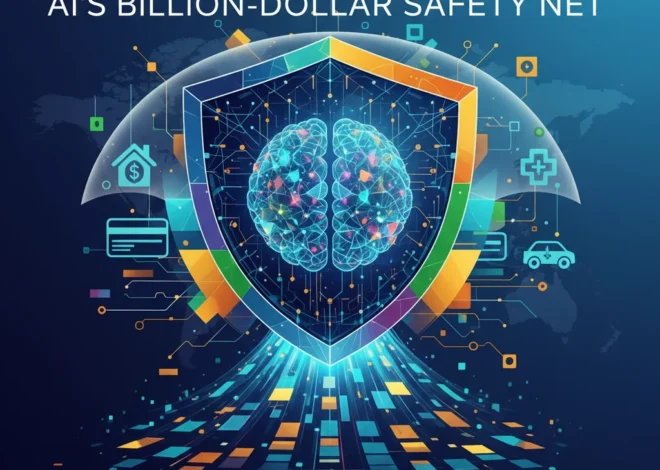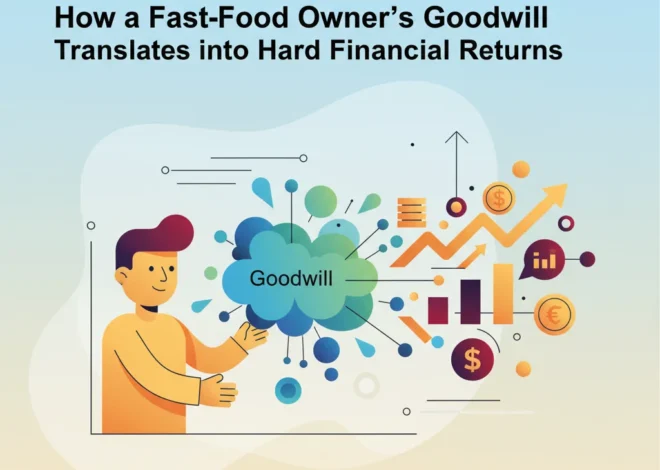
Beyond the Golden Arches: Why the McDonald’s Scandal is a Wake-Up Call for Every Investor
In the fast-paced world of finance and investing, market-moving news often comes from earnings reports, central bank announcements, or shifts in macroeconomic indicators. However, a recent headline concerning McDonald’s serves as a potent reminder that some of the most significant risks to a company’s bottom line don’t originate in the boardroom or on the trading floor, but from the very fabric of its corporate culture.
The fast-food giant has publicly committed to a new legal agreement with the Equality and Human Rights Commission (EHRC), Britain’s equality watchdog, to better protect its staff from sexual harassment. This decision was not proactive; it was a direct response to a damning BBC investigation that uncovered a toxic culture of abuse, with over 100 current and recent staff members alleging instances of harassment, racism, and homophobia. For investors, finance professionals, and business leaders, this story is far more than a human resources issue—it is a critical case study in the financial materiality of corporate governance and social responsibility.
The Alphabet Soup of Modern Investing: Decoding ESG
For decades, the primary lens for evaluating a company’s health was purely financial. Metrics like P/E ratios, revenue growth, and debt-to-equity dominated the conversation. While these are still vital, a more holistic framework has gained significant traction in the global economy: ESG, which stands for Environmental, Social, and Governance. This approach posits that a company’s long-term success and sustainability are inextricably linked to its performance in these three key areas.
- Environmental (E): This pillar assesses a company’s impact on the planet, including its carbon footprint, waste management, and use of natural resources.
- Social (S): This focuses on how a company manages relationships with its employees, suppliers, customers, and the communities where it operates. Key issues include labor standards, data privacy, diversity and inclusion, and, critically in this case, workplace safety and employee well-being.
- Governance (G): This examines a company’s leadership, executive pay, audits, internal controls, and shareholder rights. It’s the framework of rules and practices that ensures accountability, fairness, and transparency.
The McDonald’s situation is a textbook example of failures in the ‘S’ and ‘G’ pillars. The widespread allegations point to a significant breakdown in social responsibility—a failure to protect its most valuable asset, its people. This, in turn, reveals a critical lapse in governance—a failure of oversight and internal controls to prevent such a systemic issue from festering. For the modern investor, this isn’t just a moral failing; it’s a flashing red indicator of potential financial turbulence.
Beyond the Basics: Four Pillars of Financial Mastery in the Modern Economy
From Reputational Risk to Stock Market Shockwaves
How does a workplace culture scandal translate into tangible financial risk? The pathway is clearer and more direct than many assume. The immediate fallout often includes legal costs, regulatory fines, and settlement payouts, which can run into the millions or even billions. But the indirect costs are often far greater and have a longer-lasting impact on a company’s position in the stock market.
Brand reputation is one of the most valuable, yet fragile, assets a company possesses. In an age of instant information, news of a scandal can erode decades of consumer trust overnight. This can lead to boycotts, reduced sales, and a significant loss of market share. Furthermore, a toxic work environment directly impacts operational efficiency through higher employee turnover, increased recruitment and training costs, lower productivity, and a diminished ability to attract top talent.
The investment community is increasingly pricing these risks into their models. Institutional investors, asset managers, and even retail traders using sophisticated fintech platforms are integrating ESG scores into their decision-making processes. A company with poor governance and social metrics is now seen as a riskier bet, potentially leading to a lower valuation, a higher cost of capital, and a sell-off by major funds. The history of the stock market is littered with examples of companies whose share prices plummeted following major governance or ethical failures.
To illustrate the tangible financial impact of such crises, consider the historical precedent set by other major corporations:
| Company & Scandal | Immediate Stock Price Impact | Long-Term Financial Consequences |
|---|---|---|
| Volkswagen (Dieselgate, 2015) | Dropped over 35% within days (source) | Over €30 billion in fines, recalls, and legal costs; significant loss of market share and consumer trust. |
| Wells Fargo (Account Fraud, 2016) | Fell approximately 13% in two months | $3 billion in penalties, Federal Reserve asset cap, complete executive overhaul, and years of rebuilding its reputation in the banking sector. |
| Equifax (Data Breach, 2017) | Plummeted 35% in one week (source) | Hundreds of millions in settlement costs, intense regulatory scrutiny, and a fundamental blow to its business model built on trust. |
While McDonald’s may not face the same level of immediate financial cataclysm, this table demonstrates a clear pattern: severe governance failures are punished swiftly and severely by the market. The proactive steps McDonald’s is now taking are a form of damage control, an attempt to reassure investors that they are shoring up the very foundations of their corporate structure.
The New Economic Paradigm: From Shareholder to Stakeholder
The McDonald’s case is a microcosm of a larger shift in economics and corporate philosophy—the transition from shareholder primacy to stakeholder capitalism. The former, championed by Milton Friedman, argued that a company’s only social responsibility is to increase its profits for shareholders. The latter, which is rapidly becoming the new standard, contends that a company must create long-term value for all stakeholders: employees, customers, suppliers, communities, and the environment, in addition to shareholders.
This is not an altruistic ideal; it is a pragmatic business strategy. A company that mistreats its employees will eventually suffer from poor service, high turnover, and reputational damage, which harms customers and, ultimately, shareholders. A company that ignores its environmental impact faces regulatory risk and may lose customers to more sustainable competitors. The interconnectedness is undeniable.
This paradigm shift has profound implications for every facet of finance. Asset managers are launching ESG-focused funds, investment banks are advising clients on sustainability strategies, and banking institutions are factoring ESG risk into their lending decisions. The world of trading is also adapting, with algorithms being designed to react to ESG-related news in real-time. There is a growing consensus that sustainable and ethical practices are not a barrier to profit but a prerequisite for it in the 21st-century economy.
Nvidia's Trillion-Dollar Handshake: Decoding the AI Megadeals with Asia's Tech Titans
Actionable Takeaways for Investors and Leaders
The revelations at McDonald’s offer clear, actionable lessons for anyone involved in the financial markets or corporate leadership.
- For Investors: Look beyond the balance sheet. Integrate ESG analysis into your investment process. Scrutinize a company’s employee relations, read their corporate governance reports, and be wary of companies with a pattern of labor disputes or ethical scandals. These are no longer “soft” issues; they are hard indicators of risk.
- For Business Leaders: Culture is a financial asset. Proactively invest in creating a safe, respectful, and inclusive workplace. Strong governance isn’t about restrictive bureaucracy; it’s about creating robust systems of accountability that protect the company from its own worst impulses. The cost of prevention is always a fraction of the cost of a cure.
- For Finance Professionals: The tools of financial analysis are expanding. The ability to understand and quantify ESG risk is becoming a core competency. Whether in asset management, corporate finance, or financial technology, incorporating these non-financial factors is essential for providing sound advice and generating sustainable returns.
In conclusion, McDonald’s commitment to new harassment training is the final, reactive step in a long chain of events that began with a failure of corporate culture and governance. For the astute observer, this story is not just about a fast-food chain’s internal problems. It is a powerful signal of the evolving landscape of risk and value in the global economy. The companies that thrive in the coming decades will be those that understand that how they treat their people is not just a matter of ethics, but a fundamental driver of their financial performance and their standing in the stock market.


